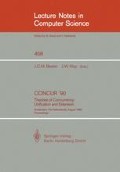Abstract
We introduce a variant of binary programs called elementary programs, based on a set of algebraic operations on a lattice of expressions. We propose a version of SLD-resolution that evaluates elementary programs by a unique operation of arrow composition and we study its OR-parallel implementation.
Elementary programs will become the target of our program transformations operating on more expressive programs like the definite metaprograms we consider subsequently.
Unfolding, remarkably simple on elementary programs, gives them an alternative semantics. Through a transformation that forces their fair evaluation, we also present a more efficient technique to compute their logical meaning.
Preview
Unable to display preview. Download preview PDF.
6. References
G. Levi, "Models, Unfolding Rules and Fixpoint Semantics", in R. Kowalski, K. A. Bowen (eds.), Logic Programming: Proceedings of the Fifth International Conference and Symposium, p.1649–1665, MIT Pres, 1988.
J.W. Lloyd, "Foundations of Logic Programming",(2nd ed.), Springer-Verlag,1987.
M.J. Maher "Equivalences of Logic Programs",in J. Minker (ed.) Foundations of Deductive Databases and Logic Programming, Morgan Kaufmann, p. 627–658, 1988.
R.A. O'Keefe, electronic message on USENET in comp.lang.prolog, the 19-07-1988.
G.D. Plotkin, "A Note on Inductive Generalization", in B. Meltzer, D. Mitchie (eds.), Machine Intelligence 5, p. 153–165, 1970.
J.C. Reynolds, "Transformational Systems and the Algebraic Structure of Atomic Formulas", in B. Meltzer, D. Mitchie (eds.), Machine Intelligence 5, p. 135–151, 1970.
J.A. Robinson, "A Machine-oriented Logic Based on the Resolution Principle", J. ACM 12,1, p. 23–41, 1965.
T. Sato, H. Tamaki, "Unfold/Fold Transformation of Logic Programs" in Proc. of 2nd International Logic Programming Conference, p. 127–138, 1984.
T. Sato, H. Tamaki, "Existential Continuation", New Generation Computing 6, p. 421–438, 1989.
K. Ueda, "Making Exhaustive Search Programs Deterministic', New Generation Computing 5, p. 317–326, 1987.
M.H. van Emden, R.A. Kowalski, "The semantics of predicate logics as a programming language", Journal of the A.C.M., 23(4), 733–742.
D.H.D. Warren, "Higher order extensions to PROLOG: are they needed", in Machine Intelligence 10, Ellis Horwood, 1982.
R. Yang, "Solving Simple Substitution Ciphers in Andorra-I", in G. Levi and M. Martelli (eds.), Logic Programming: Proceedings of the Sixth International Conference, p. 113–130, M.I.T. Press, 1989.
Author information
Authors and Affiliations
Editor information
Rights and permissions
Copyright information
© 1990 Springer-Verlag Berlin Heidelberg
About this paper
Cite this paper
Tarau, P., Boyer, M. (1990). Elementary logic programs. In: Deransart, P., Maluszyński, J. (eds) Programming Language Implementation and Logic Programming. PLILP 1990. Lecture Notes in Computer Science, vol 456. Springer, Berlin, Heidelberg. https://doi.org/10.1007/BFb0024183
Download citation
DOI: https://doi.org/10.1007/BFb0024183
Published:
Publisher Name: Springer, Berlin, Heidelberg
Print ISBN: 978-3-540-53010-7
Online ISBN: 978-3-540-46298-9
eBook Packages: Springer Book Archive

